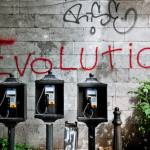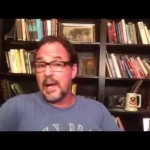We run our website the way we wished the whole internet worked: we provide high quality original content with no ads. We are funded solely by your direct support. Please consider supporting this project.
Everybody’s Got a Prequel
My wife and I, along with some friends, recently attended the Broadway Play Wicked. Without giving too much away, I’ll tell you the play attempts to answer the question: What could have possibly made the “Wicked Witch of the West” so [apparently] evil (as presented in the original Wizard of Oz)? After all, normal young ladies don’t just wake up one day and decide to find their enjoyment in tormenting poor Scare Crows, Tin Men, Cowardly Lions and little farm girls with their “mangy little dogs.”
Might it have something to do with the fact that she was born green?
By giving us “the rest of the story,” the play “Wicked” exposes how little we really knew about this “Wicked Witch” from the original Wizard of Oz and how shallow and misguided our initial judgments about her were. By giving us the “prequel” to her life, we’re moved toward compassion instead of judgment.
The fact is, all of us have a “prequel.” From the mass murderers to the terrorists to the pedophiles to the prostitutes to the gang members — and, yes, even to the gossipers, gluttons and judgers — there’s a story which, if we knew it well, would help explain why they are the way they are. People don’t just decide one day to be wicked. Things happen. There’s always a story to be told.
Does this mean that people aren’t morally accountable for their actions? Not at all. For we are not just products of our environment and genes. We make choices, for which we’re responsible. But it does mean that only God knows the extent of our moral accountability, which is why only he can legitimately judge another person (I Sam. 16:7).
Does this mean that society shouldn’t take strong measures to protect itself from murderers, pedophiles and the like? Of course not. For the good of the whole – and perhaps sometimes for their own good — some people must be locked away.
But followers of Jesus are called and empowered to go beyond the socially necessary judgments of society. We’re called to love all people at all times, including our enemies. We’re called to do good to those who do us harm. We’re called to believe the best and hope the best about everyone (I Cor. 13. 7), We’re called to regard our own sins, whatever they are, to be tree trunks in comparison to other peoples sins, whatever they are (Mt. 7.1-3).
We’re called to live in the mode of Jesus’ final prayer: “Father forgive them, they don’t know what they do.” (See the essay Living Jesus’ Prayer For Forgiveness). They may in fact know what they do, but that is not for us to decide. We are to leave all judgment to God (Rom. 12:19-21; Ja. 4:10-12). Our job is to hope for their forgiveness and agree with God that each and every person we see was worth God dying for. Each person has unsurpassable worth, regardless of what they do, and our job as followers of Christ is to show our agreement with this assessment by how we think, speak and act in relation to them.
So whether you end up seeing the play Wicked or not, have compassion on the Wicked Witch… and everyone like her. Prayerfully wonder what their “prequel” might look like, and pray for their forgiveness.
Category: General
Tags: Forgiveness, Judgement, Kingdom Living
Related Reading

7 Ways to Join the Kingdom Revolution
In the previous post, I introduced in short form the call to participate in the kingdom revolution that Jesus began. What does this mean for us today? Let me offer seven ways we are called to the Jesus revolution: When Jesus set aside the riches of his divine prerogatives and sided with the poor and…

Warfare and Sickness
Is sickness something we should come against as spiritual warfare or is sickness just something that is part of our life until the Kingdom of God comes? Greg deals with the answer to this question.

Does Prayer Really Make a Difference?
I know the traditional cliché that prayer is for our sake, not God’s. It changes us, not God, or God’s plans. Even C .S. Lewis said that! I have the greatest admiration for Lewis, but on this account I think he is dead wrong. Prayer does certainly change us, but that’s not why we’re told…

How God Changes the World
All who place their trust in Jesus look forward to a day when he will return and fully establish the kingdom of God. When this happens, Scripture promises that everything will change. There will be no more sickness, death, hunger, natural disasters, violence, fear, heartaches, sin, or evil. There will be no more racism, nationalism,…

Lies, Truth, and the Holy Spirit
The root of the flesh is a lie about who God is and who we are. Satan brings us into bondage of the flesh by convincing us that God is not the loving God he says that he is. In doing this, Satan convinces us that we cannot find fullness of life by being wholly…

Revolting Against Classism
All fallen societies and religions have a tendency to rank people according to class. All have ways of separating the insiders from the outsiders, the holy from the unholy and the more important people from the less important people. Jesus revolted against classism by the way he lived, a way defined by the Kingdom. Now,…
